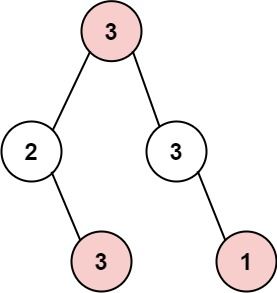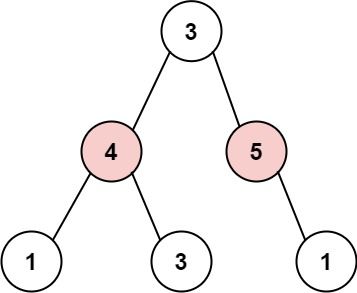小偷又发现了一个新的可行窃的地区。这个地区只有一个入口,我们称之为 root 。
除了 root 之外,每栋房子有且只有一个“父“房子与之相连。一番侦察之后,聪明的小偷意识到“这个地方的所有房屋的排列类似于一棵二叉树”。 如果 两个直接相连的房子在同一天晚上被打劫 ,房屋将自动报警。
给定二叉树的 root 。返回 在不触动警报的情况下 ,小偷能够盗取的最高金额 。
示例 1:
输入: root = [3,2,3,null,3,null,1] 输出: 7 解释: 小偷一晚能够盗取的最高金额 3 + 3 + 1 = 7
示例 2:
输入: root = [3,4,5,1,3,null,1] 输出: 9 解释: 小偷一晚能够盗取的最高金额 4 + 5 = 9
提示:
- 树的节点数在
[1, 104]范围内 0 <= Node.val <= 104
我们定义一个函数
函数
如果
否则,我们首先计算出左右子节点的结果,即
- 如果偷取
$root$ 节点,那么不能偷取其左右子节点,结果为$root.val + l_b + r_b$ ; - 如果不偷取
$root$ 节点,那么可以偷取其左右子节点,结果为$\max(l_a, l_b) + \max(r_a, r_b)$ 。
在主函数中,我们可以直接返回
时间复杂度
# Definition for a binary tree node.
# class TreeNode:
# def __init__(self, val=0, left=None, right=None):
# self.val = val
# self.left = left
# self.right = right
class Solution:
def rob(self, root: Optional[TreeNode]) -> int:
def dfs(root: Optional[TreeNode]) -> (int, int):
if root is None:
return 0, 0
la, lb = dfs(root.left)
ra, rb = dfs(root.right)
return root.val + lb + rb, max(la, lb) + max(ra, rb)
return max(dfs(root))/**
* Definition for a binary tree node.
* public class TreeNode {
* int val;
* TreeNode left;
* TreeNode right;
* TreeNode() {}
* TreeNode(int val) { this.val = val; }
* TreeNode(int val, TreeNode left, TreeNode right) {
* this.val = val;
* this.left = left;
* this.right = right;
* }
* }
*/
class Solution {
public int rob(TreeNode root) {
int[] ans = dfs(root);
return Math.max(ans[0], ans[1]);
}
private int[] dfs(TreeNode root) {
if (root == null) {
return new int[2];
}
int[] l = dfs(root.left);
int[] r = dfs(root.right);
return new int[] {root.val + l[1] + r[1], Math.max(l[0], l[1]) + Math.max(r[0], r[1])};
}
}/**
* Definition for a binary tree node.
* struct TreeNode {
* int val;
* TreeNode *left;
* TreeNode *right;
* TreeNode() : val(0), left(nullptr), right(nullptr) {}
* TreeNode(int x) : val(x), left(nullptr), right(nullptr) {}
* TreeNode(int x, TreeNode *left, TreeNode *right) : val(x), left(left), right(right) {}
* };
*/
class Solution {
public:
int rob(TreeNode* root) {
function<pair<int, int>(TreeNode*)> dfs = [&](TreeNode* root) -> pair<int, int> {
if (!root) {
return make_pair(0, 0);
}
auto [la, lb] = dfs(root->left);
auto [ra, rb] = dfs(root->right);
return make_pair(root->val + lb + rb, max(la, lb) + max(ra, rb));
};
auto [a, b] = dfs(root);
return max(a, b);
}
};/**
* Definition for a binary tree node.
* type TreeNode struct {
* Val int
* Left *TreeNode
* Right *TreeNode
* }
*/
func rob(root *TreeNode) int {
var dfs func(*TreeNode) (int, int)
dfs = func(root *TreeNode) (int, int) {
if root == nil {
return 0, 0
}
la, lb := dfs(root.Left)
ra, rb := dfs(root.Right)
return root.Val + lb + rb, max(la, lb) + max(ra, rb)
}
a, b := dfs(root)
return max(a, b)
}/**
* Definition for a binary tree node.
* class TreeNode {
* val: number
* left: TreeNode | null
* right: TreeNode | null
* constructor(val?: number, left?: TreeNode | null, right?: TreeNode | null) {
* this.val = (val===undefined ? 0 : val)
* this.left = (left===undefined ? null : left)
* this.right = (right===undefined ? null : right)
* }
* }
*/
function rob(root: TreeNode | null): number {
const dfs = (root: TreeNode | null): [number, number] => {
if (!root) {
return [0, 0];
}
const [la, lb] = dfs(root.left);
const [ra, rb] = dfs(root.right);
return [root.val + lb + rb, Math.max(la, lb) + Math.max(ra, rb)];
};
return Math.max(...dfs(root));
}
